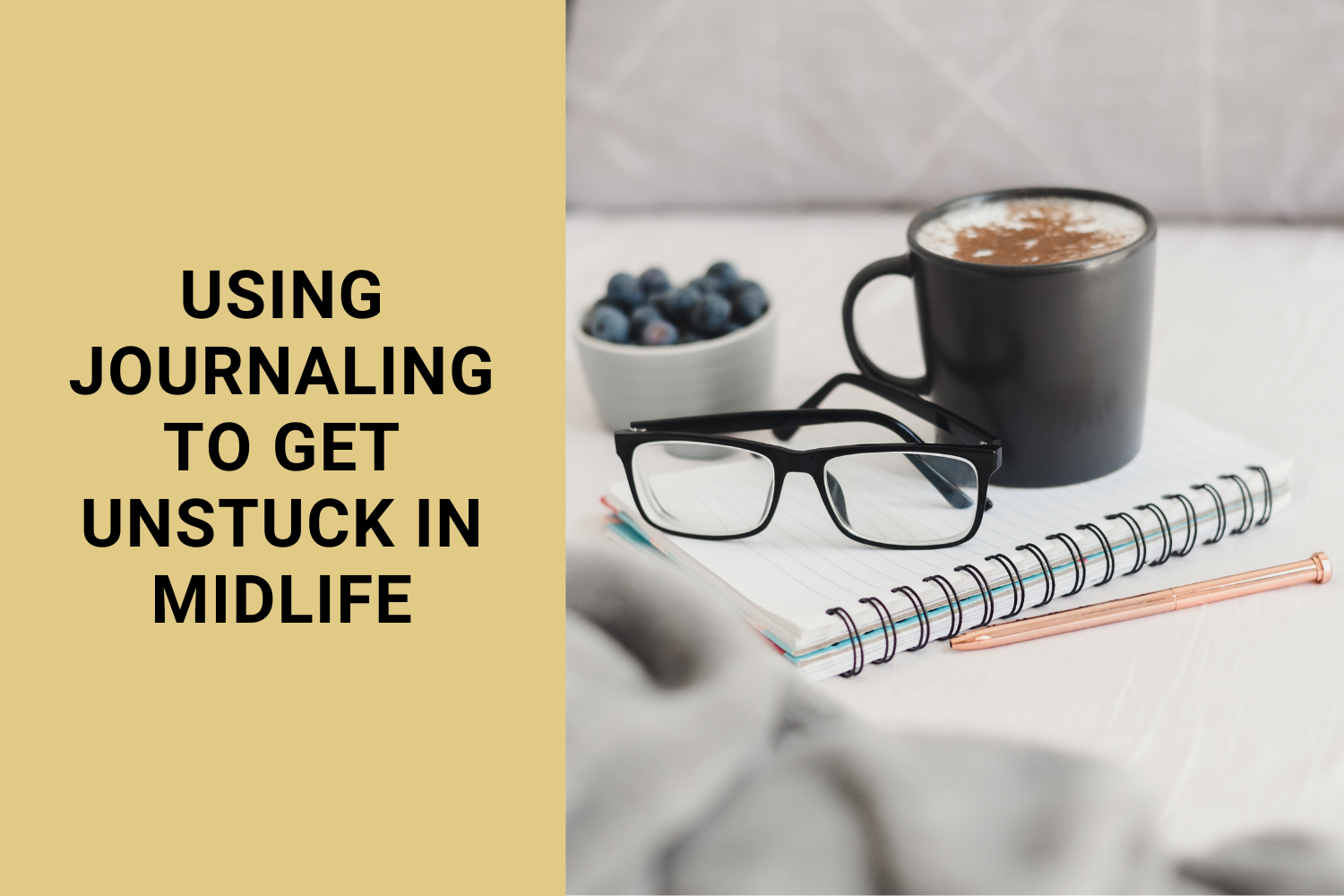Many people think journaling is like keeping a diary, but there is a fundamental difference. A diary is used to record external events in your life, but a journal is to record your thoughts, feelings, and ideas. The difference can be profound.
Consider these benefits of keeping a journal:
A journal creates focus.
Few of us really take the time to examine our lives. We commonly feel that we either don’t have the time, it won’t be beneficial, or it’s simply too uncomfortable. By regularly making an appointment with yourself to work with your journal, you can create the necessary focus to make positive changes in your life. Setting this intention and following through is powerful, especially during the turbulence so many midlife women experience.
A journal forces you to see the truth.
We’re all amazing at fooling and distracting ourselves, but when the truth is right before our eyes in black and white, there’s no place to hide. Midlife can be a haze of floundering around on an emotional rollercoaster. Seeing your daily thoughts, feelings, and struggles will help you see themes. Repeatedly writing about the same issues day after day can help you see what you need to address to feel better.
A journal releases stress.
It may seem counterproductive to write about your struggles, but there’s something cathartic about getting your thoughts on paper. Processing the emotions through writing helps to release them from your body. The act of writing with paper and pen can be grounding, helping to center and calm you. Reducing your stress also creates a more effective state of mind to help you get unstuck in midlife.
A journal provides a means of measuring progress and growth.
Have you ever seen a friend’s child and noticed how much they’ve grown? You wouldn’t notice the growth if you saw that child every day. Our own personal growth is similar. Small changes aren’t noticed when you’re exposed to them daily. Plus, part of being stuck in midlife is that you’re overwhelmed with feelings of not being good enough, being too old, listening to the inner critic in your head, and not knowing what you want. It can be easy to discount small steps and improvements you are experiencing. A journal provides a way of looking back and seeing just how far you’ve come.
Use your journal to get unstuck in midlife:
Record your thoughts about what you’re experiencing each day.
Find a quiet place. Create a sacred ritual for this practice. You might choose the same time or place each day at first to get started. What’s happening today? How does it make you feel? Take some time to really be honest with yourself and process your emotions.
Include both positive and negative experiences.

Many times, when women start journaling, a lot of the focus is on what’s NOT working. That’s ok. That’s part of the process. It’s very powerful to keep writing (complaining) about the same thing over and over again. Eventually, this will lead you to take some action (see below). But even if you’re stuck and focusing on negative experiences in the beginning, try to end your session with at least one positive thing that happened each day. One thing that brings you joy or makes you smile.
Brainstorm action steps.
Eventually, you will see recurring themes that help you realize that you’re getting tired of just complaining about the same things over and over. This is when you can start to include brainstorming ideas about how you would like things to be different and what action steps you could take to move in that direction.
Choose small action steps that are simple and easy to accomplish.
A little momentum can be invaluable. It might be as simple as going for a 10 minute walk every day, or scheduling some alone time doing something you really want to do, or finding a good book to read, or listening to inspiring podcasts.
Record your progress.
Each day when you sit down to journal, make sure to record the actions that you took and how they make you feel. Remember to celebrate small steps and moments of joy each day. Remember, one of the benefits of journaling to get unstuck in midlife is being able to look back through and see the progress you’re making.
Look for dissonance.
Everyone is self-sabotaging to varying degrees. Journal through your thoughts and behaviors that are creating resistance to your progress. For example, if you want to lose 25 pounds but you’re eating ice cream every day, that’s a behavior that’s not supporting your goal. Your journal is one way to process through the thoughts and feelings you have, being honest with yourself while also not beating yourself up. Include self-loving kind language. Talk to yourself the way you would talk to someone you love.
Explore journaling prompts and coaching questions to help you get unstuck in midlife
If you’re intimidated by staring at a blank page, try journaling prompts, books for self-reflection with journaling prompts, or lists of coaching questions to use when you really want to dig deep on an issue. Many midlife women find it helpful to blend this type of journaling. If you’re feeling really stuck, use coaching questions. If you want some inspiration, find a spiritual book with daily reflections to write about each morning.
It’s your journal, for your use only. There’s no right or wrong way to do it! Journaling is an effective way to create momentum to get unstuck in midlife. Even if you’re skeptical, give journaling a try for a few months to see if it starts to make you feel better. You can start by downloading my free Affirmations Reflections with Journaling Prompts. These are designed for midlife women and will help you jumpstart a journaling practice.

